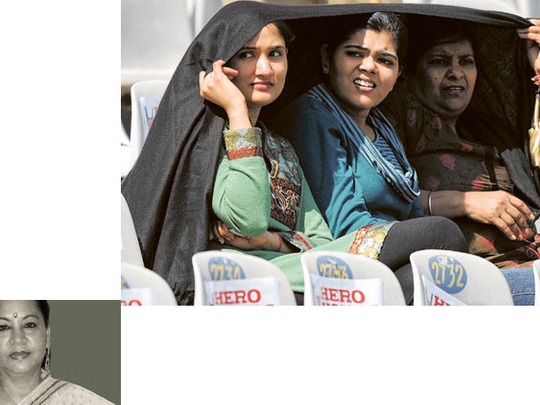
Even today, a woman feels that she has to be twice as talented as a man to be recognised as his equal. So, in any profession, if she has been successful she undoubtedly has been outstanding. Not only has she to be outstanding but also carry the necessary reserves of strength to bear the multifarious burdens of being wife, mother and careerist without rocking any boat. The announcement of a record three women winning the Nobel Peace Prize is therefore balm to the soul and a vindication of feminist struggles through time.
The status of women in society is the true index of its cultural, social and spiritual levels. It is an important criteria for estimating the degree of development attained by a particular society during various periods of history.
Conversely, historians and researchers have evidence to conclude that denial of education to women was responsible for the gradual deterioration of the social status of women throughout the world.
So if we have women at the helm of affairs in practically every field, be it a profession, industry, academics, the arts or politics, we in India must also realise that after more than six decades of independence in India, we still have a long way to go if even today the woman labourer sits at a construction site, breaking rocks while her infant plays amidst the stones and mortar, with little hope for a chance to attend school and so improve her own lot.
A similar fate is shared by the Indian gypsy or Lambadi, also a labourer yet freer in spirit, her striking features hinting at global origins lost in the mists of time, dressed in vibrantly colourful, voluminous skirts and covered in traditional finery of bone and silver despite the hardships of her nomadic life.
A part of our daily routine is the vegetable woman, calling out her wares at break of dawn as she walks the streets and by-lanes with her basket on her head. I never cease to wonder whether she has already prepared a meal for the family before setting out or will have to do that only after earning the daily bread.
The bangle woman, favourite of young and old alike, is to be seen not merely sitting at small stalls, but at every fair in a village or town. A visit to her is a must before every festive occasion in the country when the clink-clink of glass bangles keep time with the music and singing even as they augur a bright and prosperous future.
Agriculture is still the backbone of the Indian economy where women toil with their menfolk in the fields but increasingly in other areas too women have begun working to augment the family income.
Education
Educating a child is one of the most important functions of a woman and the best teachers and educationists are found among them. No hospital can function without its nurses, no office is complete without its receptionist, and it has often been said that there is a qualitative difference in the service rendered by female clerks in banks.
The most delicate work in a factory requires the hands of its female workers. Thus, certain professions are traditionally regarded as bastions for the fairer sex.
Indian art and culture owes much of its richness to the women who have developed and practised their individual metiers ceaselessly. We have outstanding female dancers and singers, gifted filmstars and directors. In the field of literature and art are many immortals like Qurratulain Hyder and Anjolie Ela Menon while in social work, their dedication to improving the lot of their fellow beings has been phenomenal.
Other professions which were earlier male dominated have opened their doors to women. We have very able senior women police officers, women pilots in civil and military aviation, in the civil and foreign services at the highest levels, in the judiciary as justices and lawyers, doctors in various specialisations and women heading banking and industry.
So what is it that a man can do and a woman cannot do as well? Since centuries, even pre-Mughal times, Indian women have played a prominent role in the political affairs of the country. They have held the posts of mayors, ambassadors, MPs, chief ministers and governors, even prime minister, no small achievement in this vastly disparate country. There are inspiring stories of highly educated young persons readily giving up lucrative career options to go back to their roots and serve at the grassroot level in their village or town and empower that society.
Today, it rests with the women of India to see what sort of influence they want to make. The atmosphere is crackling with challenge and opportunity which combined with a strong will, can make that vital difference and change for a better quality of life.
Vimala Madon is a freelance journalist based in Secunderabad, India.










